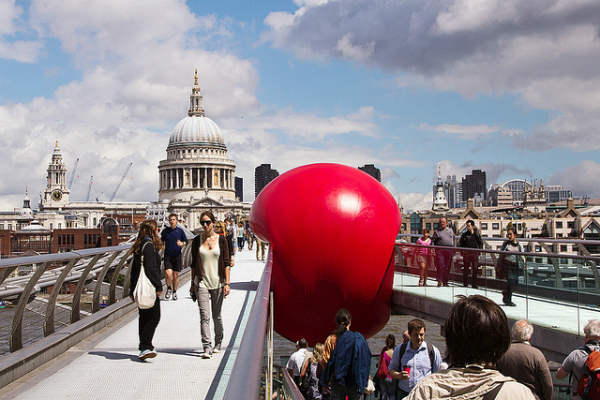
Photo via: Flickr
The Shell ad that promotes the Peterhead CCS project, with a red ball in London’s Trafalgar Square
Photo via: Carbon Visuals
Have you seen Shell’s latest billboard campaign? The one that features a huge red ball in London’s Trafalgar square? Well, it wasn’t an original idea but a blatant appropriation, according to artist Kurt Perschke who has accused the oil and gas company of plagiarism, the Guardian reports.
New York-based Perschke began his RedBall project—which involves placing a 15-foot-tall red ball in iconic urban settings like public squares and bridges, or squeezed between buildings—back in 2001. Since then, the RedBall project has toured many city across the world, including London (as part of the Cultural Olympiad in 2012), Abu Dhabi, Taipei, Barcelona, St. Louis, Sydney, Chicago, and Toronto.
Last month, Shell introduced its new campaign to mark the launch of its Peterhead CCS project, which it has dubbed “the world’s first full-scale gas carbon capture and storage project.” According to the company, the effort marks a significant step towards reducing the UK power sector’s carbon output by storing carbon emissions under the North Sea. The billboard ads feature a huge red ball in London’s Trafalgar Square and Forth Rail Bridge near Edinburgh, with the slogan “Imagine capturing this much C02 every hour.”
Do the ads bear more than a passing resemblance with the RedBall project? Perschke definitely thinks so.
“It’s painful,” he told the Guardian. “There isn’t any doubt in my mind. Even though it might seem that a ball would be a ball would be ball, [my] red ball is specific in the way it is constructed and built and these graphics that they have created are spot on.”
Kurt Perschke’s RedBall in London’s Millennium Bridge in 2012
Photo via: Flickr
Shell has staunchly denied the accusations. A spokesperson from the company told the Guardian: “[This campaign] uses red spheres as a visual device to illustrate the volume of CO2 that the Peterhead CCS project is designed to capture each day. It is intended to help consumers understand […] the importance of capturing CO2 for a better energy future.”
The crux of Shell’s argument is that, instead of having installed a physical ball in the locations, as Perschke does, the ads simply use a CGI of a red ball to visualize their idea. The company also stresses that visualizing carbon emissions spherically is common practice.
Although Perschke has not decided yet whether he will take the oil giant to court, he is definitely frustrated that no one in the company thought to contact him to ask him first. “I don’t demonize advertising agencies but no one likes being ripped off by a mega corporation,” he argued. “The larger issue is the impact on the work, I don’t want the work impacted or associated in this way. We’ve worked for many years on a project which really does bring joy and surprise to people and we don’t want it co-opted.”
To make matters worse, this is not the first time that a corporation has allegedly appropriated the RedBall project in an advertisement. Last year, the artist won a case against the French company Edenred, which had also used the large-redball-in-public-square motif on a TV commercial.